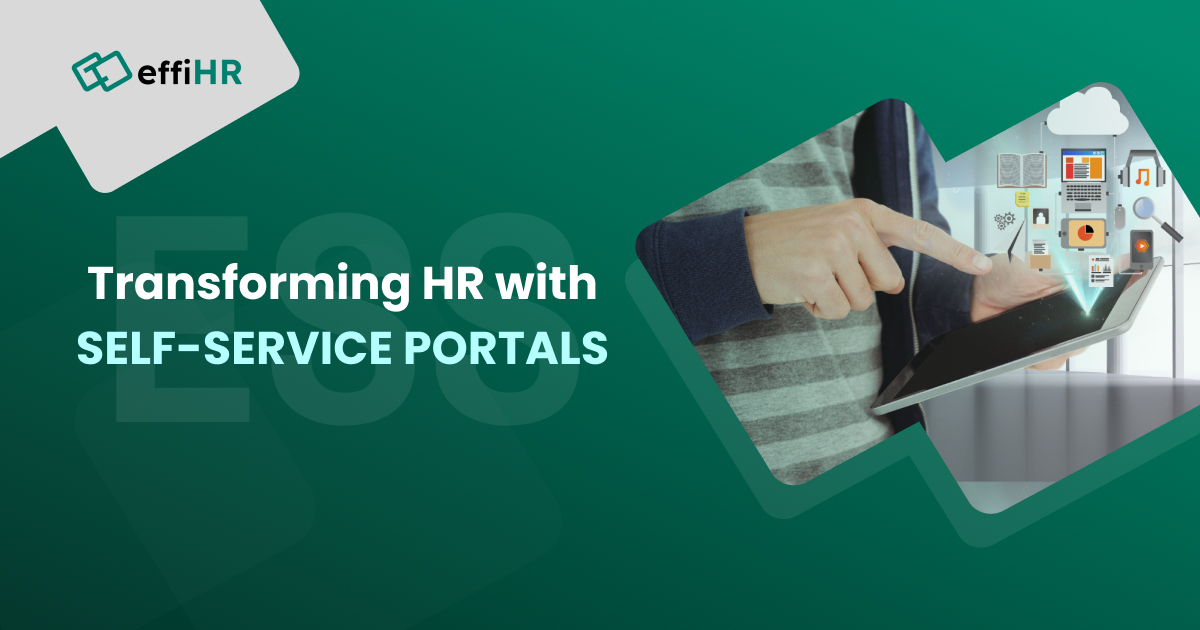Share Article
Get in touch
In the fast-paced business landscape, one of the most significant innovations driving this transformation is the rise of self-service portals in HR. Portals, like effiHR, empower employees to access and manage their HR-related tasks autonomously, reducing the dependency on HR personnel and streamlining operations. As businesses grow, the need for efficient, scalable solutions becomes increasingly vital, and self-service portals are proving to be game-changers in the process. Integrated with HRMS Software, these portals create an all-encompassing, real-time HR management experience that drives greater efficiency.
Empowering Employees for Peak Efficiency
Self-service portals are a strategic weapon that enables employees to complete almost all of their human resource needs, ranging from changing personal details to filing for leave, administration of benefits, and even pay slips. This autonomy not only boosts employee satisfaction by providing them with greater control over their information but also enhances operational efficiency within the HR department. HR professionals can now focus on more strategic roles, such as talent development and organizational planning, while employees manage their routine tasks independently. Integrated with Employee Performance Software, these portals allow employees to track their progress and receive real-time feedback, aligning personal goals with organizational objectives.
Cost-Effectiveness and Resource Optimization
The automation provided by self-service portals significantly reduces the administrative burden on HR teams. By eliminating manual processes, such as data entry and document handling, these portals save time and resources. Organizations no longer need to allocate as much manpower to respond to individual employee queries, which leads to a decrease in operational costs. Additionally, the centralized nature of self-service portals ensures that all HR data is accessible in real time, eliminating delays and enhancing decision-making. When paired with HR Management Software, these portals offer seamless integration that centralizes all HR functions, enabling HR teams to optimize resources and reduce overhead costs.
Boosting Accuracy and Minimizing Errors
With traditional manual HR systems, the risk of errors is high—whether it’s incorrect data entry or miscommunication. Self-service portals reduce these errors by giving employees direct access to update their details and manage their leave requests. When employees are responsible for updating their information, there’s a lower likelihood of mistakes, leading to more accurate HR records. Moreover, the self-service approach ensures that employees are directly involved in maintaining the accuracy of their data. These portals also ensure that data from HRMS Software and Employee Performance Software remains consistent and error-free, providing HR teams with up-to-date, reliable information.
Fueling Employee Engagement and Satisfaction
The rise of self-service portals is not just about efficiency; it’s also about improving employee experience. When employees are empowered with the ability to quickly and easily access HR services, they feel more in control and valued. A seamless self-service experience can significantly boost employee morale, fostering a culture of trust and transparency. Employees no longer need to wait for HR to process requests or answer queries, which leads to faster responses and increased satisfaction. By integrating Employee Performance Software in effihr, employees gain instant access to performance metrics and development plans, driving engagement and motivation across all levels of the organization.
The Future of HR: Seamless Personalization and Integration
As technology continues to evolve, the capabilities of self-service portals like effihr will only expand. The next frontier for these platforms involves enhanced personalization—tailoring the portal experience to individual employee needs. AI and machine learning could soon play a role in predicting employee needs and offering personalized recommendations based on their past interactions and preferences. Integration with other organizational tools, such as payroll software, performance management systems, and HRMS Software, will further increase the efficiency of self-service portals, making them an even more integral part of the employee experience. These advanced capabilities will transform self-service portals into a hub for holistic employee management.
Conclusion
The growing importance of self-service portals in HR cannot be overstated. As organizations strive for efficiency, cost-effectiveness, and improved employee engagement, self-service portals integrated with HR Management Software are emerging as crucial tools in HR management. By empowering employees, optimizing resources, reducing errors, and enhancing satisfaction, these platforms are transforming the way HR departments operate and how employees interact with HR services. As businesses continue to adapt to the future of work, self-service portals like effihr will undoubtedly remain at the forefront of this evolution, driving long-term success and organizational growth.





